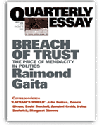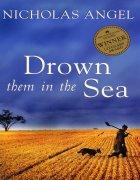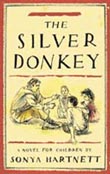
It's hard to believe that Quarterly Essay is now four years old. It has become such a part of the landscape of political debate in this country in that time that I find it pretty much indispensable. Although not all essays in the series have created a large amount of debate, there have been a few that have really got under the skin of a number of media pundits. I think in particular of John Button's "Beyond Belief - What Future for Labor?" in QE 6, "Beautiful Lies - Population & Environment in Australia" by Tim Flannery in QE 9, and the most controversial, Germaine Greer with "Whitefella Jump Up - The Shortest Way to Nationhood" in QE 11, which was selectively and massively mis-quoted by the mainstream media. The storm that one raised still sends ripples through Australian politics from time to time.
So the Quarterly Essay series has covered a number of topics, most, it must be said, from a center-left standpoint. And this has enraged the attack dogs of the current Federal Government, who have the view that the whole of the media is out to get them: a typically paranoid worldview that is held by every political party when in power. If they actually sat back and thought about it for a moment they might take the view that their policies are actually being discussed, and it is the Australian way to attempt to intimidate and attack the best players on the opposition side. But, of course, that would lead to an acceptance of the fact that some people out there might not, deep down, like them very much. Heaven forbid.
Which brings us to the latest Quarterly Essay 16, titled "Breach of Trust - Truth, Morality and Politics" by Raimond Gaita. Gaita is Professor of Moral Philosophy at King's College, University of London and Professor of Philosophy at the Australian Catholic University, so is perfectly positioned to argue "for a conception of politics in which morality is not an optional extra". His main Australian "targets" in this essay are the politicians who have the power to shape the current Australian thinking and the future of Australian society. In other words, the current Federal Government. As soon as I picked up the current issue and started to read, I could visualize the hackles starting to rise on the neck of the Liberal Party's
href="http://www.tonyabbott.com.au/">Tony Abbott. He's not one to take any form of criticism lightly. I can only assume that the current "silly season", when everyone is more interested in sunshine and sport, is the only thing that has kept him slavering all over the newspaper "Op-Ed" pages in response to this essay.
I've been having a lot of trouble coming to terms with the re-election of the Howard coalition government in last October's Federal election. I haven't been overly enamoured with the other side of politics (the Australian Labor Party) for the past several years, but I felt they had a reasonable chance this time of upsetting a government which I considered had lost its way, and lost the trust of the Australian people. The final result, where the coalition won control of both Houses of Federal Parliament, shocked and appalled me, and proved that, as a political pundit, I have no idea.
John Howard and I go back a long way. My memory of events thirty years ago may not be exactly correct but I have read recently that Howard entered Federal politics in the general election in 1974, the election that returned the Whitlam Government. As best I can figure out, that was the first election in which I was legally entitled to vote and, given that voting is compulsory in Australia, it was the first election in which I cast a ballot. So Howard has been a part of my visual and auditory landscape for the whole of my political life. It is not something I look back on very kindly.
Howard's political history is long and detailed: he became Minister for Special Trade Negotiations in 1975 and then Treasurer in Fraser's Government in 1978; he was Leader of the Opposition more times than I care to remember, and was finally elected Prime Minister (the position he had always coveted) in March 1996. He has been in that position ever since, recently becoming the second longest-serving PM in the nation's history, only behind his hero Robert Menzies. Whichever way you look at it, whatever side of politics you find yourself on, you have to admit that John Howard is the consummate Australian politician of his generation. No one has had anything like the effect on the Australian ethos and the way Australia is viewed by the rest of the world. Bill Bryson may not be able to remember his name from one week to the next, but George Bush sure knows where and who he is. And that state of affairs might have more to say about where this country currently finds itself than I care to think about.
Australia has changed in the past ten years or so, and changed for the worse. I'm not one to hark back to the days of my youth and see a wide land of sunny skies and bright, smiley people. The country I grew up in the sixties and early seventies was a gauche, insular backwater. Nouvelle cuisine was defined as putting mayonnaise on your fish and chips. The pubs shut at six o'clock and indigenous Australians weren't counted in the census, let alone having the right to vote. And then things started to change in the early seventies. Whitlam was elected in 1972, the Vietnam War ended, and a new wave of immigrants started to arrive in this country from South East Asia bringing with them a new social order. And in this midst of all this stood John Howard, alone of his Federal cabinet colleagues (so the story goes) to vote against allowing the "boat people" of the late seventies special immigration status. While everyone at that time was looking ahead, Howard harked back to the fifties with its white picket fences; husband, wife and three kids on a suburban quarter-acre block; and only white faces as far as the eye could see. He hasn't changed - he did say that he would be the most conservative Prime Minister Australia has ever had in 1996 - but has now changed the political/media landscape to such an extent that his brand of "liberal" conservatism is now mainstream. I hated it. I hated the whole idea that what I saw as the "Australian way of life" - a classless society where everyone is given a fair go regardless of race, colour or creed - was being subverted into a division of the "haves" and "have nots". And I started to be ashamed to say I was Australian. How could I justify my love of the country and its people when the only face it showed to the world was a narrow-minded, bigoted, selfish nature? Whenever I defended the place I felt I was really trying to convince myself more than the listener of the country's worth. And I seriously considered leaving, packing up the family and heading off to the United Kingdom, where I could look back on the Australia I knew and loved with the rose-coloured glasses of the ex-patriot. But I'm still here, and still annoyed, and still ashamed of what's going on.
Which is why it is such a relief to come across something like the following: "There is therefore no reason for those who were depressed by Howard's victory to feel ashamed of being Australian, though they have reason to feel ashamed of some things Australia has done. The present and the past of most countries is a mixture of good and evil. One can be proud of the good things and ashamed of the evil while loving the country and its people. Sometimes it is a painful love." Gaita explores the questions of trust, and why it is important, for politicians. He acknowledges that they must sometimes be "economical with the truth" about specific issues but argues for a sense of morality and ethics that sits above the day-to-day political manoeuverings. I would have liked him to skewer a few more current politicians by name but I suspect he may well have thought this would diminish his message. He states: "Illiteracy about the nature of politics and about the
relation between it and morality distorted our public life long before the Howard years. It would be foolish to believe that the Prime Minister has been responsible for it. Intentionally or not, however, he and his government have deepened it and profited from it."
I don't believe that reading this essay has changed my view of where Australia is at present and where I see it going. It has, however, put a number of things into a bit more perspective and offered a few pointers about how to reconcile short and long term politics. I can see that I will have to come back and re-read this essay some time in the next year or so. A second reading might give me the perspective I need to appreciate the arguments somewhat better. I hadn't meant to go on this long with this "review". I just tend to get a bit carried away when it comes to talking about current politics and politicians. There hardly seems to be sense of vision amongst any of them. And that pains me a lot.






